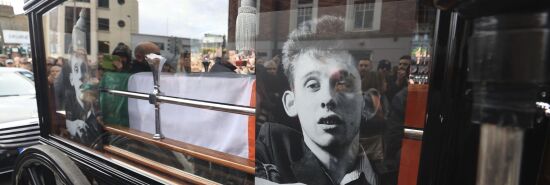
With punk and pluck, Shane MacGowan sustained the Irish folk tradition
Sean Higgins
Video Embed
“In Ireland, folk music is a living tradition,” a crotchety old drunk in a Galway pub once told me. It wasn’t simply about revering the past by teaching children the songs of their forefathers, he added. Each new generation adds to that tradition by adding songs of their own.
Few people better exemplified this tradition than Shane MacGowan, the lead singer and songwriter of the Irish band The Pogues. MacGowan died on Nov. 30, just a few weeks shy of his 66th birthday on Dec. 25. He leaves behind an amazing catalog of songs and performances.
CENSURE CRAZE: HOUSE HITS REPRIMAND MILESTONE NOT SEEN SINCE 1870
He was, ironically, born in Kent, England, in 1957, though his parents were Irish, and he lived for a period in Tipperary, Ireland. He had an early love of literature, reading the likes of James Joyce and Brendan Behan while still an adolescent. By the mid-1970s, the then-teenaged MacGowan had joined the burgeoning punk movement in London. He had a moment of pre-success fame when he was featured on the cover of the magazine New Musical Express in 1977 with one ear bloodied from a bite following a particularly rowdy Clash concert. The headline was “Cannibalism at Clash gig.”
Well, how does one follow that except by creating one’s own band? MacGowan’s first was the Nipple Erectors, later shortened to just The Nips. After that didn’t work out, he joined up with a group of other Irish punks with an interest in folk music. They called themselves Pogue Mahone, which I am reliably informed translates from the Gaelic as “Kiss My A**.” The name was eventually shortened to The Pogues.
The band released a series of albums in the 1980s that revived old pub standards such as “Whiskey, You’re the Devil” and “Dirty Old Town” and placed them alongside original songs penned by MacGowan that brought folk music into the modern age with punk energy. In “The Boys from County Hell,” he describes his revenge upon a mean landlord while also admitting that, in the grand Irish tradition, he may just be making the whole story up:
I recall that we took care of him one Sunday/ We got him out the back and we broke his f***ing balls/ And maybe that was dreaming, and maybe that was real/ But all I know is I left the place without a penny or f*** all
He sang in a voice that was conventional-sounding in very early recordings but quickly evolved into a ragged, Joe Cocker-esque wail by the band’s second album. A personal favorite Pogues song, “Navigator,” wasn’t written by MacGowan. It’s about Irish laborers and was written by a friend of the band, but MacGowan makes it sound like a traditional tune passed down over the last century:
The canals and the bridges, the embankments and cuts/ They blasted and dug with their sweat and their guts/ They never drank water but whiskey by pints/ And the shanty towns rang with their songs and their fights
It was bracing, funny, rollicking stuff and about as far removed as possible from what was playing on radios and MTV at the time. MacGowan and his fellow Pogues didn’t give a toss and instead plowed ahead with their fusion of punk and Irish folk songs. Not only did they achieve success anyway, but they led a wave of other bands perfecting a similar fusion, including The Cranberries, Dropkick Murphys, Flogging Molly, and Sinead O’Connor.
MacGowan is probably best remembered for, of all things, a Christmas song: “Fairytale of New York.” It’s the only sentimental seasonal tune I am aware of with the lyric, “You scumbag, you maggot, you cheap lousy fa****.”
He did all of this while living his life in the grand tradition of the poets and writers he loved, as well as American music icons such as Hank Williams. That is to say, recklessly and not with an eye toward having a long life. His drinking and drug use became so bad by 1991 that he was kicked out of the band by the other Pogues. He had shown up at too many gigs not able to take the stage. That was when he showed up at all.
The band reformed with a mellowed MacGowan in 2001 and toured frequently until 2014. I saw several of those latter-day shows, and they were some of the best concerts I have ever attended. MacGowan was by then toothless and barely comprehensible when he sang, and yet it barely mattered. The fans knew the songs by heart and sang for him. I recall belting out the tunes while complete strangers put their arms over my shoulders. They did it first in the spirit of pure camaraderie and, later, in a desperate effort to stay upright.
CLICK HERE TO READ MORE FROM THE WASHINGTON EXAMINER
The tours ended a decade ago after MacGowan’s fragile health dictated that he stop. His death late last month was sad but not tragic. In passing, he became a part of the Irish folk tradition to which he had devoted his life.
As MacGowan sang in his song “Sally MacLennane,” We walked him to the station in the rain/ We kissed him as we put him on the train/ And we sang him a song of times long gone/ Though we knew that we’d be seeing him again.
Sean Higgins is a research fellow with the Competitive Enterprise Institute.
